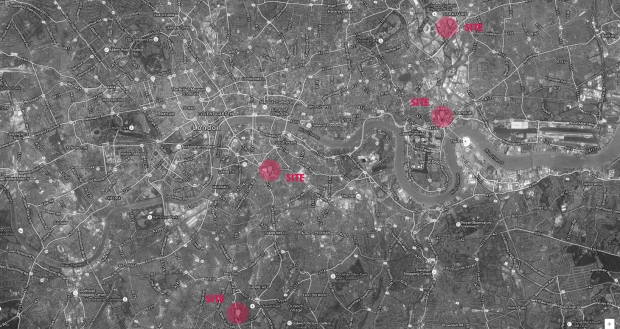Location: UEL AVA, Robin Hood Gardens, Blackwall; Heygate Estate, Elephant and Castle; Carpenters Estate, Stratford; Cressingham Gardens, Lambeth
Facilitators: Michela Pace, Jane Cheadle, Anna Minton
BLOG: Re-Place, Urban Filmmaking
DESCRIPTION
The social housing estates under investigation are located in different parts of London and are undergoing a process of transformation that can be appreciated at different stages: The Heygate Estate has already been demolished and new buildings are taking the place of the old ones, Robin Hood Gardens and Carpenters’ Estate are being emptied of their residents, Cressingham Gardens is in the initial phases of the same process.
All the estates underwent long, and sometimes tormented discussions about their quality and protection which involved the council, architects, theorists and citizens, and revealing above all a larger pattern of similar operations happening in London in the name of ‘regeneration’ and linked to housing demand, economic activity and political arrangements.
The aim is not to feed into the discussion of whether or not the buildings should be preserved, but to critically reflect on the reconfiguration of London and the demolition of housing estates, replaced by luxury housing. The aim is to investigate the key issues that informed the projects then and now at the double scale of city planning and neighbourhood liveability. We aim to question how the quality and physicality of places stands within the fundamental condition of modernity, transformation and political context.
Students will work individually to make a series of short movies as well as participating in collective lectures and seminars. The movie making will critically reflect upon the transformation of the sites through experimental approaches.
The result will be a series of short movies on different estates, which are neither a dry recording of places nor the more common production of images tied to architecture. The research element of the course will focus on key themes such as the privatisation of public space, segregation in communities and the increasing securitisation of the environment, particularly where public housing is concerned, as is the case on Robin Hood Gardens, the Heygate Estate, Carpenters’ Estate and Cresssingham Gardens. Other sites for study include the Aylesbury Estate, Woodberry Down, Sweets Way, the Haggerston Estate, Broadwater Farm and many more.
Jane Cheadle is an artist who makes large scale, site specific films using exploratory techniques.
Anna Minton is a journalist and professor at UEL. Author of the book Ground Control, she is an expert on the privatisation of public space, segregation in communities and the increasing securitisation of the environment.
Michela Pace is research fellow at UEL and deals with the storytelling of the city through photography.
THE BRIEF
Explore fundamental issues related to the topic and applied to the estates:
– A rigorous process is essential in order to define the idea of the film (outline a storyboard, define a message, select and produce the materials that serve your aim).
– A collaborative approach is expected. Sharing expertise and abilities over programs and techniques is fundamental part of the discussion.
– An artistic approach is also expected: means of representation and meaning should be associated with care, flexibility and imagination.
– Students need to ensure that they are realistic in what they can deliver so as to not leave the project unfinished. Students will also need to commit to work autonomously, being aware that the creative process and output are as important as the objects of study.
– Students are expected to spend some time on site filming. This can also happen autonomously. Students should be able to administrate their own schedule in managing surveys and film production.
TECHNICAL CONSIDERATIONS
No expert knowledge is required but students taking this course should have a basic knowledge of digital cameras and laptop use. Students will be expected to use video editing software (we are suggesting to download the trial version of Premiere if you don’t have preferential software, but also iMovie, Windows Movie Maker, Final Cut Pro, Blender etc. can be used). Students will be expected to share skills amongst the group and undertake self-directed tutorials online to cover any basic technical skills they need in advance of the course.
MATERIALS NEEDED you will need to have your laptop. The cameras and tripods will be provided, but if you have your own please bring them.
OUTCOMES
Each student should choose one estate and produce 1min long movie for each week, for a total of two 1min long movies. The short movies will be montaged each week producing two longer films.
In addition and ONLY for the 4th year, a fully documented group report needs to be submitted using the Indesign template provided on the Workshop blog on 9th November 2015.
KEY RISKS TO CONSIDER
The risk assessment is a document that asks you, the team to collaborate in anticipating the activities you are about to engage in, and to develop a strategy to deliver a safe and effective outcome. This is not a chore – it is core – an architect who cannot establish a safe project is not an architect. Update the risk assessments online via the blog and upload for review as Revision A latest Friday 2nd October.
CALENDAR and BIBLIOGRAPHY

